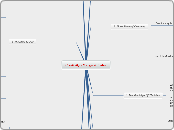Creativity - Margaret Boden
1. What is creativity?
Human Creativity can often be viewed as a mystery
"Creativity is the ability to come up woth ideas or artifacts that are new, suprising and valuable"
"New" has two meanings P&H
Psychological Creativity
New to the person that comes up with it
Historical Creativity
No-one has had the idea before
Suprising - 3 Meanings
Unfamiliar/Unlikely
An unexpected idea that fits in to the original style of thinking.
Feeling of astonisment when an "impossible" idea is encountered
2. Three Forms of Creativity
Exploring conceptual spaces
Ideas are already there
Normally from a persons culture/peer group
Any disciplined way of thinking that is familiar to a certain social group
Allows you to see the possiblilities that you havent seen before
Transforming the space
"Rerouting the motorway"
Tweaked or radically tranformed
Thlought to be impossible
Novel Combinations
Making an unfamiliar combination of familiar ideas
An intelligble pathway between ideas
Ideas "Make sense"
Using store of knowledge
Use different ways of moving within the mind
3. Machine Maps Of The Mind
Artificial Inteligence - Conceptial spaces and ways of exploring and tranforming them
Enables ut to construct and test a hypthesis
A Conceptial approach to creativity gives us a way of coming up with scientific hypthesis about the rich subtlties of the human mind.
4. Computer Combinations
Putting two ideas alongside eachother
Combinational creativity requires:
A rich knowledge base
An ability to form and evaluate links between ideas
Example: JAPE computer programme
Made Punning Jokes
5. Exploratory Combinations
Random changes in rules to create new structures/ideas
AARON > Line Generator
Difference between parent and child image is difficult to see
Evolving ideas instead od designed ideas
6. Values and Creativity
Not Just relevent to computers
It is difficult to recognise a novel idea
There are many intiguing relations between creativity and computers
Computers cane come up with new ideas and help people to do so to.
Both Faliures and successe of computers help us to think about our creative powers
9. Thinking the impossible
In the absence of magic or divine inspiration, the mind's creations must be produced by the mind's own recources
Combination theroies identify creative ideas as those which involve unusual or suprising combinations
Some may say "statistically suprising"
The concept of creativity is value-laden
Ideas must be illuminatin or challenging in some wayg
To be creative it is not enough for an idea to be unusual - not even if its valuable
Its not enough for the idea to be a novelty
H creativity can only be based on history known to us
P creativity is crucual tofor asessing the creativity of individual human beings and their ability to produce ideas
Creativity as a personal quality is judged primarily in terms of p creativity
H creativity is often understood in terms of extremely unusal as opposed to just unusual
Computive ideas help us to specify generative principles clearly
8. The Story So Far
The Bath, The Bed and the Bus
Summerises what creative people have told us about how they came by their ideas
Creative ideas often come at a time when the person appears to be thinking about something else, or nothing at all
Reports of creativity mention no imagery but a sudden apperance of a solution to the problem
Creativity cannot be explained as a conscious process alone
It is calimed that creativity requires a hidden cobination of uncoscious ideas
4 Phases of creativity (Poincare)
Preparation
Incubation
Illumination
Varification
"Creativity is uncoscious work followed by conscious work"
Uncoscious work triggered by a coscious thoughts
Creativity requires no specific power but an element of intellegence in general
Obscessive ideas are sometimes so outlandish and disorganised as they are judged to be mad
The dividing line between madness and creativity is hard to define
7. Mystery of creativity
It is hard to phsychologically define creativity
Mystery
Beyond Science
If a puzzle is an unanswered question a mystery is a question that can barely be asked let alone answered
Computers and "AI"
Computers help us to see how people are creative
Computers cannot be creative because they can only do what they are programmed to do by us
Computers can only do what the programmer enables it to do
Computers can appear to be creative
Claim: " If the source ofg creativity is superhuman/divine, or if it springs inexplicably from some special hman geneius, computers must be utterly irrelevant."
Computers are implemented rather than embodied
Are not irrelevent to us understanding creativity
Human Creativity
Not Just suprising but ofen umnpredictable
Dependent on the human brain
It is misleading to refer to creativity as a capacity
Creativity requires expertise through understanding a series of technical practices.
